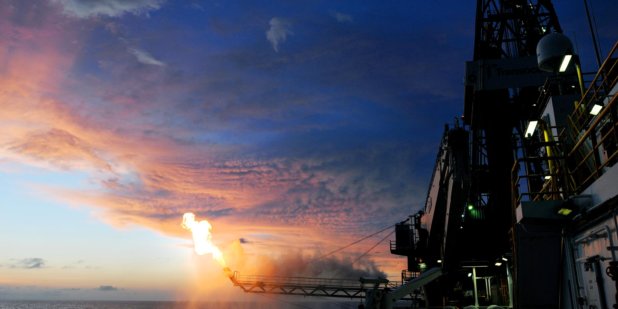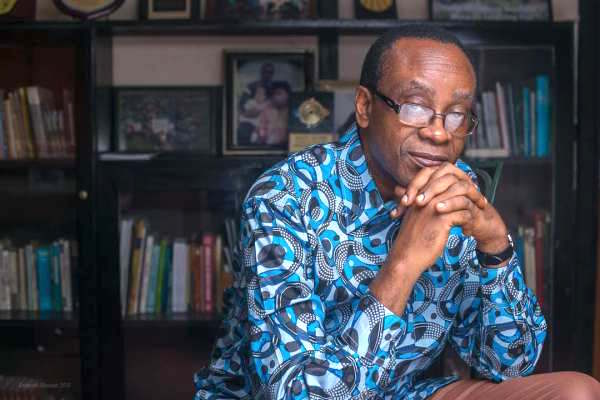- About
- Topics
- Picks
- Audio
- Story
- In-Depth
- Opinion
- News
- Donate
-
Signup for our newsletterOur Editors' Best Picks.Send
Read, Debate: Engage.


Bassey worked tireless to convince the Nigerian government that the oil spills that occurred in the Niger Delta led to a genocide of the people of the Ogoni, an ethnic group living in the Delta. It's fair to say that without Bassey's struggle there won't be a cleaning project like the Ogoni clean-up, which is about to start soon.
fairplanet: What is the current state of affairs in der Niger-Delta right now? Has the Ogoni-Project to clean-up the Niger-Delta already commenced?
Nnimmo Bassey: The situation is that based on a repost of the program issued by the authorities in 2011, there've been some kind of effort to get it on the ground, but it wasn't until August 2016, that the actual administrative architecture for the clean-up project was set up.
By March 2017 the coordination and implementing team was set up and engaged. So it took quite some time to get it going so far. The administrative body that organises the clean-up and channels all the funding provided by the companies that caused all the polluting is called "Hydrocarbons Pollution Remediation Project" (HYPRED) and has started preliminary work. What has been done so far are demonstrations of how the clean-up could be carried out, and also health assistance to the communities that are affected by the crude oil pollution. And I think they are now in the process of commencing an implementation of water supply to the communities. That is actually a kind of emergency action that should have been carried out much earlier.
 Nnimmo Bassey, Director, Health of Mother Earth Foundation (HOMEF), Photo: Independent
Nnimmo Bassey, Director, Health of Mother Earth Foundation (HOMEF), Photo: Independent
In fact, there are two kinds of clean-up that a taking place in Ogona at the same time. One clean-up is based on a lawsuit against Shell by the Bodo community in Ogona, which was in a court in London against Shell for oil spills that happened in 2008 and 2009. Shell has taken complete responsibility for that oil spill, but they are also required to do a clean-up at the Bodo Creek, which has just started.
But the bigger clean-up, which should take care of all the polluted soil and water has not yet started. What has started are preliminary works, and I think that HYPRED right now is concluding an action plan or master plan, whatever you want to call it, to give an outlook of what will happen in the weeks and months to come. And as soon as that is concluded, I'm sure the clean-up will start very rapidly.
When do you personally expect the clean-up to commence?
The commmencement I expect to happen in one or two months.
What about the security situation on the ground at the moment? There have been quite some concerns in recent years about militant local groups trying to blackmail government and to take foreigners, especially workers of the oil companies, as hostages.
I think with regard to the clean-up, everybody has an agreement, everybody is involved and everybody is anxious for the cleaning to start. Therefore I don't see a security problem with regard to the clean-up. There might be some security issues with the government around in the country, but there is nothing really that could stop the clean-up. None.
You know, the clean-up has a lot of implications for everybody. There are quite a lot of young people from Ogoni that are currently running a second stage of training to be part of the clean-up, they are exercising hardly. That is very important. The clean-up won't commence with a workforce coming from elsewhere. That would cause some instability, to put it nicely. In the Shell clean-up that has already started, there are about ninety percent of the workforce coming from Ogoni people. That is something that could develop very positively in the long run.
Is Shell involved in that bigger clean-up as well?
Everybody, every company that was involved in the oil drilling is involved in the cleaning. Shell, Eni and all the others, they are providing the finance for the clean-up.
How many quare kilometers are polluted in total?
Well, that's a difficult question. You know, the Niger-Delta is very, VERY widespread. About 30 Million people are living in that area. Ogoniland, which is only a part of the delta, is 1.000 square kilometers, with about 1 Million people living in Ogoni. And there is still a lot of ongoing pollution in the Niger-Delta. So, the experiences of the clean-up in Ogoni will show us, what will possibly happen to other parts of the Niger-Delta. The UNEP report estimates tell that it should take about 25 years to clean the water and about 5 years to clean the land. That is 30 years of clean-up in total, and that's a long time. And that's why people can not wait to see the cleaning project to start.
Is it correct that the Ogoni-Project is meant as a compensation from the government and from the oil companies for the genocide that was committed on the Ogoni people in 1996?
That's a difficult question. Let's put it that way: the clean-up is a response to the undeniable fact of evidence-based output of the research carried out by UNEP in the region, showing that the environment is absolutely polluted and the drilling caused that horrific situation. And the clean-up will put on hold that deteriorating situation, which is a big shame for the country and a big threat to the people in Niger-Delta.
Do you feel supported by the government, either federal or regional, in that situation?
Well, it's a difficult situation now. The clean-up is organised by the government, and the state governments look at the people on the ground to make sure that it actually happens. So I think everybody is on the same plate with regard to the prospect having Ogoni and the Niger-Delta cleaned up. The only complaint is that things should happen more quickly.
You and your organization "Friends of the Earth" are cooperating with the german-based NGO "One Earth One Ocean". What does that cooperation look like?
One Earth One Ocean is an NGO that provides assistance to the clean-up, they don't ask for payment or contracts from the government, rather they're providing training for the local people, and technology that is good for the environment, i.e. that is not further polluting. I've seen a demonstration of it in one of our community training programmes. And everyone believes that, with many organisations like that, that can bring assistance to the communities and to the people of Nigeria, they should be most welcome. They bring not-for-profit help that is very innovative, and that is something that you rarely see in that part of the world.
Is the Nigerian government happy with NGOs coming from abroad to be part of the project? Or would they prefer to have domestic companies doing the job, since there's so much money involved in a project that could last 30 years or more?
I can't speak for the government. But I can say Nigerian people are happy with help from NGOs coming in. They showed that they are interested in the environment and the people, so they are most welcome; they showed solidarity with the people and the culture, and our people are grateful for that. People are very open here, and as far as I can say the government is not antagonistic to organisations that come to help.
Do you see any problems with corruption at the clean-up project?
I'm not a business man, so I can't talk about this issue. But I'm sure nobody will have to pay any bribes to be part of the Ogoni clean-up. Because all the people want the clean-up to be done profoundly. The clean-up is paid completely by the companies that caused the pollution, and they set up structures to organise and to monitor the process. There's no room for paying bribes.